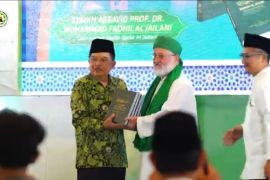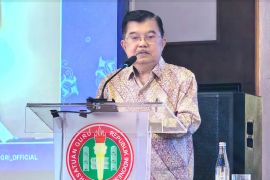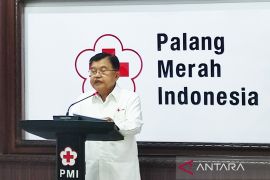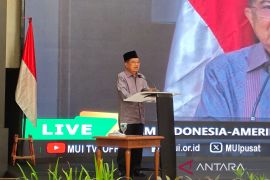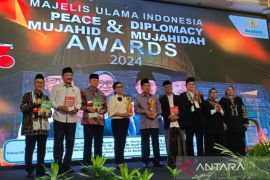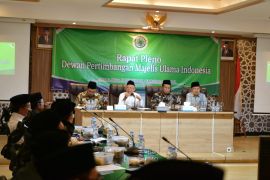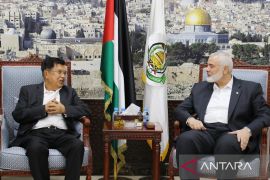What had happened in Bali some years ago was the result of those people moving to Afghanistan."Jakarta (ANTARA News) - Watch out for individual terrorists returning home after fighting alongside terror groups overseas such as the Islamic State of Iraq and Syria (ISIS) in the Middle East.
That was the message from the International Meeting on Counter-Terrorism (IMCT) which just concluded in Bali, on August 10, 2016.
Some 140 delegates from 23 countries attended the meeting themed "Countering Cross-Border Movement of Terrorism," which was officially opened by Vice President M. Jusuf Kalla.
The phenomenon of foreign terrorist fighters (FTFs) has become a threat to every nation, Chief of the National Counter-Terrorism Agency (BNPT) Commissioner General Suhardi Alius warned.
"The perpetrators of terrorism, who not only come from local areas but also from overseas, enter certain countries to carry out various actions. This phenomenon is one of our key areas of focus for undertaking terrorism preventive measures," Alius noted in a press statement, Wednesday.
There is also a growing phenomenon of ISIS sympathizers moving to Iraq and Syria to join the militant group.
In the past, hundreds of Indonesians had gone to Afghanistan to join Al Qaeda.
"What had happened in Bali some years ago was the result of those people moving to Afghanistan. The government does not want this to recur with the return of Indonesians from Iraq and Syria," Alius remarked.
The recruitment by the ISIS can be considered as human trafficking. They use the Internet to communicate with and recruit new members, Alius believed.
The FTF is a cross-border terrorism phenomenon, whose emergence coincided with the creation of the ISIS.
In Indonesia, the Santoso-led Eastern Indonesian Mujahidin also had FTFs joining the group, Alius said.
Due to the FTFs, the death of Santoso, who was recently neutralized by the Indonesia security force, does not mean the country is free from the problem of terrorism.
The problem should be evaluated and considered as a lesson to anticipate the presence of FTFs in the future.
One of the Indonesians currently still joining the ISIS in Syria is Bahrun Naim, who allegedly masterminded a terror attack in downtown Jakarta in January this year.
Terrorism will continue to become a threat as radicalism has spread everywhere, particularly following the emergence of the ISIS as a new terror force.
As part of the international community, Indonesia has been implementing counter-terrorism mechanisms that have been agreed upon internationally.
In addition to hard approaches, the government is also intensifying de-radicalization programs to curb terrorism by using soft and tolerant religious narratives and involving various relevant stakeholders, among other things.
The police have also continued to improve professionalism and capacity building in counter-terrorism.
Besides, Indonesia has opened up for cooperation with other countries in counter-terrorism.
"We cannot do it alone when dealing with terrorism. We need international cooperation," Alius said before delegates from Malaysia, Thailand, the Philippines, and Brunei Darussalam, apart from Singapore, and China, in a meeting between BNPT and ASEAN delegations.
Individual terrorists, known as "lone wolves" are providing a new challenge in the fight against terrorism in various countries, Indonesia's Coordinating Minister for Law, Security and Political Affairs Wiranto said in his opening remarks during the IMCT.
"The ISIS fighters returning to their respective countries create a new phenomenon known as lone wolves. This phenomenon is a new challenge that needs to be seriously addressed by us," he said in the meeting attended by delegates from Australia, India, Russia, and the United States, in addition to France, China, Russia and Turkey, among others, apart from representatives from ASEAN, the United Nations (UN) and Interpol.
Some of the lone wolves were veterans who had fought in Syria and Iraq and others were sympathizers recruited and indoctrinated by the ISIS to form small clandestine groups in their respective countries, he said.
The IMCT was convened back-to-back along with the 2nd Counter-Terrorism Financing Summit, jointly organized by the Financial Service Transactions and Reporting Center (PPATK) of Indonesia and its Australian counterpart (AUSTRAC), at the same venue, from August 8 to 11.
At the conclusion of the meeting, the participants issued a joint statement that among other things underlined the importance of effective control of states over their borders to prevent cross- border movement of terrorists and their goods, funds and material.
"Ministers recognized that terrorism has been increasingly a transnational phenomenon as it respects no national boundaries. In this regard, ministers emphasized the need to improve law enforcement and border management cooperation in combating cross-border movement of terrorism in accordance with the UN Charter and international law," the statement continued.
The ministers recognized that as ISIS/L and Foreign Terrorist Fighters (FTF) have emerged as a new global phenomenon of terrorism, the global war on terror enters a new chapter. Therefore, ministers reaffirmed their commitments to strengthen international cooperation in the fight against terrorism in all forms and manifestations.
Furthermore, they underscored that terrorism cannot and should not be associated with any religion, nationality, race, civilizations, or ethnic group.
"However, as in most cases, terrorist groups use those associations as justification, and ministers acknowledged the need to strengthen dialogue and promote moderation, tolerance, and mutual understanding by involving civil society, including communities and religious organizations, without making distinction on the categorization of terrorist," it added.
(Uu.F001/INE/KR-BSR/O001)
Reporter: Fardah
Editor: Priyambodo RH
Copyright © ANTARA 2016


